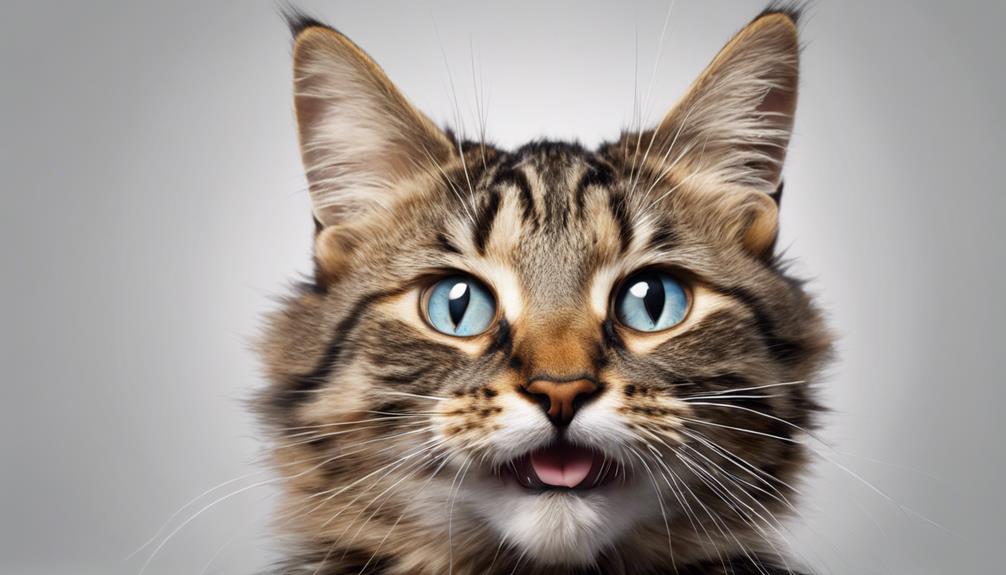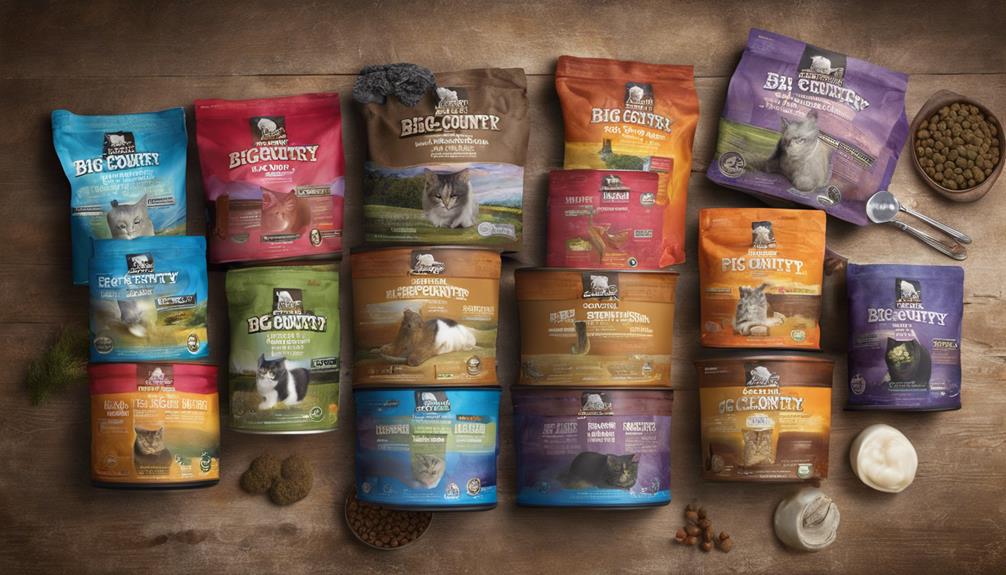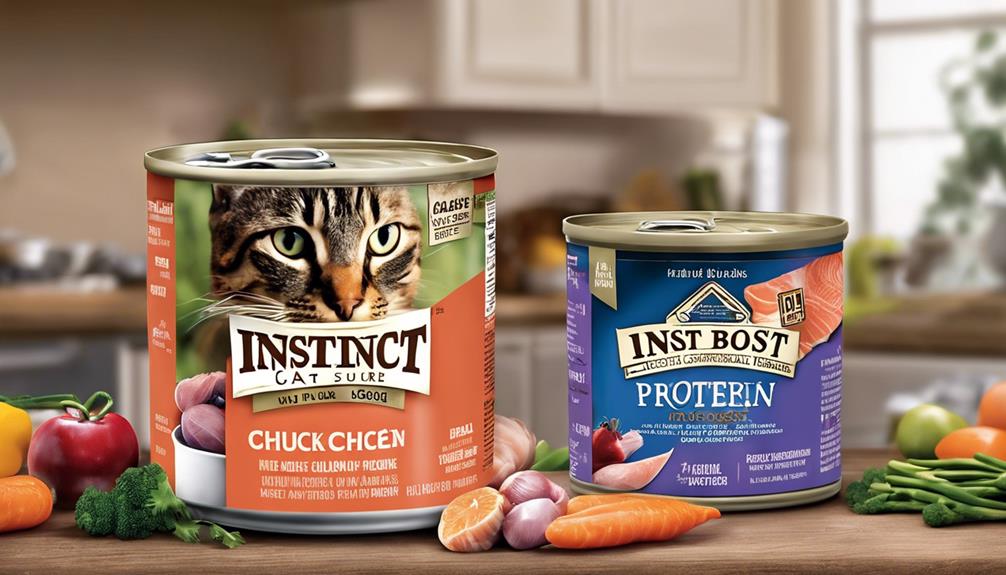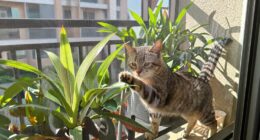Cats have a reputation for being curious animals with unpredictable eating habits. While they may show interest in what humans are eating, it’s essential to be aware that not all foods are safe for them. Some human foods can be harmful to cats, posing significant risks to their health and overall well-being. To assist you in identifying potential hazards, we have compiled a detailed guide on toxic foods for cats.
In this guide, you’ll find a breakdown of various harmful snacks and ingredients that should be avoided when it comes to feeding your cat. By being aware of these hazards, you can take the necessary precautions to ensure your pet’s safety and optimal health. So, let’s dive in and learn more about the foods that can pose a threat to our furry companions.
Key Takeaways:
- Be aware of the toxic foods that can harm your cat’s health.
- Alcohol, chocolate, caffeine, grapes, onions, garlic, and xylitol are some of the common toxic substances for cats.
- Milk, raw/undercooked meat, and salty snacks should also be avoided.
- Cats have different dietary needs than humans, so it’s important to provide them with a balanced and appropriate diet.
- If you suspect your cat has ingested a toxic food or if they show any symptoms of poisoning, contact a veterinarian immediately.
Alcohol
Alcohol is highly toxic to cats and should never be given to them. The ingestion of alcohol can cause serious health issues, including poisoning and a range of alarming symptoms. These symptoms may include:
- Vomiting
- Diarrhea
- Decreased coordination
- Tremors
In severe cases, alcohol ingestion can even lead to death. It is crucial to recognize the signs of alcohol ingestion in cats and take immediate action. If you suspect that your cat has ingested alcohol, it is important to contact a veterinarian or the ASPCA Animal Poison Control Center immediately for guidance.
Preventing Alcohol Ingestion
Make sure to keep all alcoholic beverages securely stored and out of reach of your furry friend. Be aware of the risks when hosting parties or gatherings where alcohol is present. Educate your family members and guests about the dangers of alcohol ingestion for cats, emphasizing the importance of not sharing any alcoholic beverages with them.
“Alcohol is highly toxic to cats and can have severe consequences on their health. It’s crucial to keep all alcoholic beverages out of their reach to prevent accidental ingestion.”
Symptoms of Alcohol Ingestion in Cats
| Symptoms | Description |
|---|---|
| Vomiting | Expelling stomach contents forcefully. |
| Diarrhea | Persistent loose or liquid stools. |
| Decreased coordination | Unsteady movements and lack of balance. |
| Tremors | Involuntary shaking or trembling. |
Chocolate, Coffee, and Caffeine
When it comes to cats, chocolate, coffee, and caffeine are off-limits. These popular human treats contain a substance called methylxanthines, which are toxic to our feline friends. The ingestion of methylxanthines can have serious consequences for cats, resulting in various symptoms and even death.
One of the primary symptoms of methylxanthine poisoning in cats is vomiting. If your cat has consumed chocolate, coffee, or other caffeine-containing products, you may notice them experiencing bouts of vomiting. This is their body’s way of trying to remove the toxic substances.
Diarrhea is another common symptom of methylxanthine poisoning. Cats may experience loose stools or increased frequency of bowel movements. It is important to monitor your cat’s litter box for any changes in their stool consistency or frequency, as it can be an indication of ingestion.
Abnormal heart rhythm is another potential consequence of methylxanthine ingestion. Cats may develop an irregular heartbeat, which can be a serious and life-threatening condition. If you notice any changes in your cat’s heart rate or rhythm, it is crucial to seek immediate veterinary attention.
Tremors and seizures are also possible symptoms of methylxanthine poisoning. Cats may experience muscle tremors or even full-body seizures as a result of ingesting these toxic substances. These neurological symptoms require prompt veterinary care to ensure the well-being of your cat.
It is worth noting that dark chocolate poses a greater danger to cats compared to milk chocolate. The higher the cocoa content, the more methylxanthines it contains, making it more toxic to cats. However, all chocolate products should be kept out of reach of your feline companions to prevent accidental ingestion.
Here is a table summarizing the potential symptoms of methylxanthine poisoning in cats:
| Symptoms of Methylxanthine Poisoning in Cats |
|---|
| Vomiting |
| Diarrhea |
| Abnormal heart rhythm |
| Tremors |
| Seizures |
To protect your cat’s health, it is essential to keep chocolate, coffee, and caffeine-containing products well out of their reach. Be mindful of where you store these items and ensure they are securely sealed.
Remember, your cat’s well-being should always be a top priority, and avoiding toxic foods like chocolate, coffee, and caffeine is key to keeping them safe and healthy.

Grapes, Raisins, and Currants
Grapes, raisins, and currants can be extremely harmful to cats and may even lead to kidney failure. It is crucial to prevent your feline friend from ingesting these fruits and to be mindful of their potential effects on your cat’s health. The exact toxic substance in these fruits is unknown, but it is better to err on the side of caution and avoid feeding them to your cat altogether.
Even a small amount of grapes, raisins, or currants can cause illness in cats. Symptoms of ingestion may include vomiting, diarrhea, and hyperactivity. In rare cases, these fruits can lead to kidney disease, which can have serious consequences for your cat’s overall well-being.
If you suspect that your cat has consumed grapes, raisins, or currants, it is important to monitor their behavior closely and seek veterinary assistance immediately. Kidney failure can develop rapidly, and prompt medical attention is essential for a better prognosis.

In order to prevent any accidental ingestion, make sure to keep these fruits out of your cat’s reach in your home. Additionally, if you have a garden or landscaping where these fruits may grow, take precautions to ensure that your cat cannot access them.
Onions, Garlic, and Chives
Cats are known for their particular food preferences, but when it comes to onions, garlic, and chives, it’s important for cat owners to strictly avoid these ingredients. While they may add flavor to our meals, these vegetables can cause gastrointestinal irritation and potential harm to our feline friends.
The consumption of large amounts of onions, garlic, and chives can lead to red blood cell damage and anemia in cats. The toxic compounds present in these vegetables can disrupt the normal functioning of the cat’s red blood cells, impacting their overall health and well-being. It’s worth noting that cats are more susceptible to the toxic effects of onions, but dogs are also at risk if a large enough amount is consumed.
To ensure the safety and health of your pets, it’s best to avoid feeding onions, garlic, and chives to cats and dogs altogether. Even in small quantities, these ingredients can cause gastrointestinal discomfort and potentially lead to more severe health consequences. Instead, opt for cat-friendly foods that provide the necessary nutrition without posing any risks.
“Onions, garlic, and chives can cause gastrointestinal irritation and red blood cell damage in cats.”
Remember, it’s always better to be safe than sorry when it comes to your furry companions. By being mindful of the foods you feed them, you can help prevent gastrointestinal issues, red blood cell damage, and anemia. Consult with your veterinarian for a comprehensive list of foods to avoid and ensure that your cat’s diet is tailored to their unique nutritional needs.
Quick Tips:
- Avoid feeding onions, garlic, and chives to cats and dogs.
- Choose cat-friendly foods that provide balanced nutrition.
- Consult with a veterinarian for a comprehensive list of foods to avoid.

Milk and Dairy
Cats are generally lactose intolerant and cannot properly digest milk and other dairy products. Feeding cats milk and dairy-based foods can lead to digestive upset, including diarrhea. It is best to avoid giving cats milk and limit their consumption of other dairy products.
Cats lack the necessary enzymes to break down lactose, the sugar present in milk and dairy. When lactose is not properly digested, it can ferment in the cat’s digestive system, leading to gastrointestinal distress and discomfort. The result is often diarrhea and other digestive issues.
It is important to note that not all cats will experience lactose intolerance symptoms. Some cats may tolerate small amounts of dairy without any adverse effects. However, it is still recommended to exercise caution and limit their intake.
The Health Risks of Feeding Cats Milk and Dairy:
- Diarrhea: The consumption of milk and dairy products can disrupt the cat’s digestive system, causing loose stools or diarrhea. This is a common sign of lactose intolerance in cats.
- Abdominal Discomfort: Cats may experience abdominal cramps, bloating, and overall discomfort after consuming milk or dairy.
- Nutritional Imbalance: While milk and dairy products contain certain nutrients, they are not essential for a cat’s diet. Cats have specific dietary requirements that can be better met through a balanced cat food designed for their needs.
Instead of milk and dairy, cat owners can provide their feline friends with alternative sources of hydration such as fresh water or wet cat food. Wet cat food can help meet the cat’s moisture needs while also providing essential nutrients.
Milk and Dairy Alternatives:
If you are looking for alternative options to provide a creamy texture or additional sources of calcium, there are non-dairy alternatives formulated specifically for cats. These products are lactose-free and designed to be more easily digestible for cats with sensitive stomachs. Some options include:
| Alternative | Description |
|---|---|
| 1. Lactose-free cat milk | A specially formulated milk substitute designed for cats, without the lactose. |
| 2. Cat-friendly yogurt | Yogurt made specifically for cats, with probiotics and without lactose. |
It’s always best to consult with your veterinarian before introducing any new products to your cat’s diet, especially if your cat has pre-existing health conditions or dietary restrictions.

Raw/Undercooked Meat, Eggs, and Bones
Feeding your cat raw or undercooked meat, eggs, or bones can pose serious risks to their health. These foods can contain harmful bacteria such as Salmonella and E. coli, which can lead to food poisoning in cats. Additionally, giving cats raw bones can put them at risk of choking or injury to their digestive tract.
To ensure the safety of your cat, it’s important to thoroughly cook any meat or eggs before serving them. Cooking at high temperatures kills off bacteria and reduces the risk of infection. Avoid giving your cat any bones, as they can splinter and cause obstructions or puncture the digestive tract.
When preparing meals for your cat, it’s always best to stick to a balanced and nutritionally complete cat food diet. This ensures that your furry friend receives all the necessary nutrients without the risk of bacterial contamination or choking hazards.

| Foods to Avoid | Potential Risks |
|---|---|
| Raw meat and eggs |
|
| Raw bones |
|
Salt and Salty Snack Foods
Large amounts of salt and salty snack foods can have harmful effects on cats’ health. Excessive consumption of these foods can lead to various issues, including excessive thirst, increased urination, and even sodium ion poisoning.
Cats are particularly sensitive to sodium, and their bodies are not designed to process high levels of salt. When cats consume salt-heavy snacks, it can disrupt their body’s delicate balance and result in serious health complications.
Symptoms of salt poisoning in cats may include:
- Vomiting
- Diarrhea
- Depression
- Tremors
- Elevated body temperature
- Seizures
- Death (in severe cases)
To ensure the well-being of your feline companion, it is highly recommended to avoid feeding salt-heavy snacks to cats. Instead, provide them with a balanced and nutritionally appropriate diet that meets their unique dietary needs.
Remember, cats thrive on a protein-rich diet, and there are many cat-friendly treats available that are specifically formulated to meet their nutritional requirements.
| Salt Content in Common Salty Snacks | Amount of Salt (per 100g) |
|---|---|
| Potato Chips | 1,200mg |
| Pretzels | 1,900mg |
| Cheese Puffs | 1,400mg |
| Salted Popcorn | 700mg |

Xylitol
Xylitol is a popular sweetener used in various products, including gums, candies, baked goods, and toothpaste. While it may be safe for human consumption, it can be extremely dangerous for cats if ingested. Xylitol has the potential to cause a release of insulin in cats, leading to liver failure. It is crucial for cat owners to be aware of the symptoms of xylitol poisoning and take immediate action if their cat has been exposed to this sweetener.
The symptoms of xylitol poisoning in cats can vary depending on the amount ingested. They may experience vomiting, lethargy, loss of coordination, seizures, and an elevation in liver enzymes. It is essential to seek veterinary attention promptly if any of these symptoms are observed.
To prevent xylitol poisoning, it is vital to keep products containing xylitol out of reach of cats. Be cautious when using xylitol-containing toothpaste or leaving chewing gums and candies where cats can access them. Read product labels carefully and opt for xylitol-free alternatives whenever possible to ensure the safety and well-being of your feline companion.
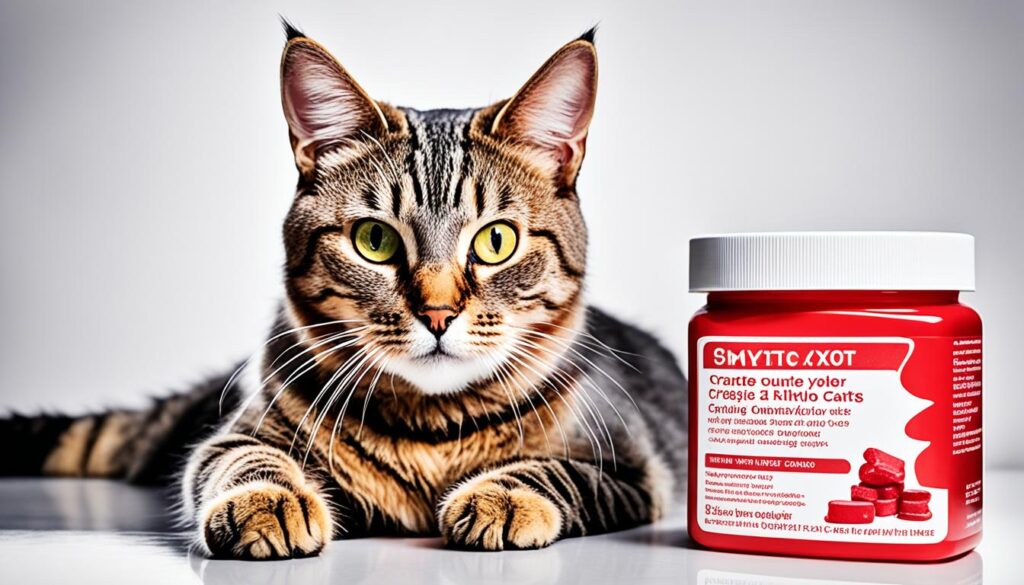
Key Points:
- Xylitol is a sweetener commonly found in gums, candy, baked goods, and toothpaste.
- Ingestion of xylitol can lead to insulin release in cats and result in liver failure.
- Symptoms of xylitol poisoning include vomiting, lethargy, loss of coordination, seizures, and elevated liver enzymes.
- Keep products containing xylitol away from cats to prevent poisoning and seek veterinary attention if symptoms are observed.
Other Foods to Avoid
In addition to the specific toxic foods mentioned above, it’s important to be cautious about other foods when it comes to feeding your cats. Cats have different dietary needs than humans and are obligate carnivores, meaning they require a protein-rich diet. Feeding cats cat food that is specifically formulated to meet their nutritional needs is essential for their overall health and well-being.
Cat food is designed to provide the necessary balance of protein, fats, and carbohydrates that cats require. It also contains essential vitamins and minerals that are specifically formulated for a cat’s dietary needs. Feeding cats a diet that consists primarily of human food can be detrimental to their health.
While occasional treats of human food can be given in small amounts, it’s important to be mindful of certain ingredients that may not be suitable for cats. Cats can have allergies or intolerances to certain foods, just like humans do. Some common allergens for cats include dairy products, seafood, and certain types of grains.
Additionally, certain foods may cause digestive issues in cats, even if they are not toxic. For example, spicy foods, rich sauces, and heavily seasoned foods can upset a cat’s stomach, leading to vomiting or diarrhea. It’s best to stick to a cat’s regular diet and avoid feeding them foods that can potentially cause digestive discomfort.
“Feeding cats cat food that is specifically formulated to meet their nutritional needs is essential for their overall health and well-being.”
When introducing new foods to your cat’s diet, it’s important to do so gradually and monitor their reaction. If you notice any signs of discomfort, such as vomiting, diarrhea, or changes in behavior, it may be an indication that your cat is intolerant or allergic to a certain ingredient. In such cases, consult with your veterinarian to determine the best course of action.
Common Foods to Avoid for Cats
| Foods to Avoid | Potential Risks |
|---|---|
| Chocolate | Toxic to cats, can cause vomiting, diarrhea, and abnormal heart rhythm. |
| Grapes, Raisins, and Currants | Can cause kidney failure in cats, symptoms may include vomiting, diarrhea, and hyperactivity. |
| Onions, Garlic, and Chives | Can cause gastrointestinal irritation and red blood cell damage, leading to anemia. |
| Milk and Dairy Products | Cats are generally lactose intolerant, can cause digestive upset and diarrhea. |
| Raw/Undercooked Meat, Eggs, and Bones | Can be contaminated with bacteria and pose a choking hazard or cause digestive injuries. |
| Salt and Salty Snack Foods | Excessive intake can lead to sodium ion poisoning and various health issues. |
| Xylitol | Sweetener that is toxic to cats and can cause liver failure. |
Remember, when it comes to cat food, dietary needs, allergies, and intolerances, it’s always best to consult with your veterinarian. They can provide tailored advice and recommend suitable options based on your cat’s specific needs. Prioritizing your cat’s health and providing a balanced, appropriate diet will ensure they lead a happy and healthy life.

Conclusion
Keeping cats safe from toxic food is essential for maintaining their health and well-being. By being aware of the common dangers associated with toxic food for cats, cat owners can take the necessary precautions to prevent their feline friends from ingesting harmful substances.
If there is any suspicion of ingestion or if symptoms of poisoning are observed, it is crucial to consult a veterinarian immediately. Prompt medical attention can make a significant difference in the outcome and recovery of a cat exposed to toxic food.
Prevention is key in protecting cats from the potential risks of toxic food. This includes keeping toxic foods out of reach, properly storing and disposing of them, and being mindful of what is being fed to cats. Providing a balanced and appropriate diet that meets their specific dietary needs is crucial for their overall health and longevity.
Remember, being proactive in preventing toxic food exposure can help keep our feline companions healthy and happy for years to come.



